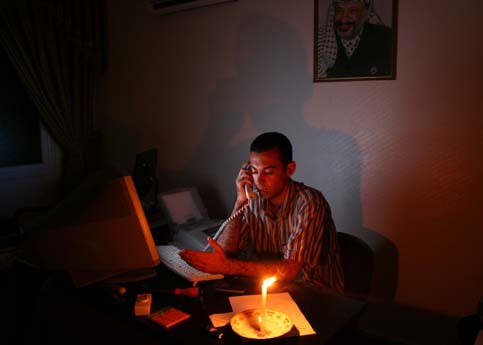Council for the National Interest 30 June 2006

A Palestinian man sits at his office in Gaza City while there is no electricity after the Israeli bombing of a Gaza power plant. (MaanImages/Wesam Saleh)
As usual, most of the American press docily followed the official line from Israel and Washington that the kidnapping[*] of an Israeli soldier a week ago was unprovoked. The fact is that the assassination of a Hamas government official was the proximate cause of the kidnapping. The assassinated official, Jamal Abu Samhadana, was the head of the Popular Resistance Committees, an organization on the terrorist list of the United States and Israel. He was apparently brought into the Hamas-led Interior Ministry to head the police forces in Gaza.
That happened only two weeks before the kidnapping but neither the press nor the television news made the connection.
The old cycle of assassination, response by the Palestinians, and an official hands-off policy by the United States will lead exactly nowhere. The U.S. refuses to see the Israeli response for what it is, collective punishment, which of course is forbidden under UN conventions and completely lacks common sense in this situation. Worse, we have been down this road so many times with the Israelis, in south Lebanon, the West Bank, and Gaza.
It seems clear that the first priority for Israel and the U.S. is to topple the Hamas government as soon as possible without undermining Mahmoud Abbas. But everything that Israel has done so far, with tacit approval from the U.S., is arousing and angering the Palestinian people. Even the officials of the PLO were outraged by the mass arrests of 64 duly-elected Hamas officials on the West Bank and in East Jerusalem.
Early Wednesday, massive air strikes and sonic booms forced hundreds of Gaza families to abandon their homes seeking safe shelter, as thousands of Israeli troops backed by tanks penetrated the Gaza strip. Israeli warplanes launched missiles at the impoverished coastal strip, destroying the only power station, which left 700,000 people living in Gaza without electricity. The restoration of the power station will take between three to six months at the cost of six to eight million dollars. Humanitarian organizations warn of yet another crisis in Gaza, since all water supply and sewage disposal pipes are powered by electricity or diesel oil, which has also been cut off by Israel. People are deprived from drinking water, cooking, and light.
The Israeli attacks, dubbed “Operation Summer Rains,” are of course an attempt to recover an Israeli soldier, Gilad Shalit, who was captured last Sunday in an attack that killed two other soldiers.
The Palestinian president, Mahmoud Abbas, condemned the attack as “collective punishment of civilians including women, children, and old people.” Abbas said these attacks minimize his chances in succeeding to negotiate a way out of the crisis, even with the help of Egypt. Olmert refused to negotiate and said, “We won’t hesitate to carry out extreme action to bring Gilad back to his family,” but it is had to see how the collective punishment and the arrest of the Hamas legislators will lead to anything but a continuing crisis regardless of whether or not the soldier is returned safely. Such a continuing crisis at this moment in the Middle East will only lead to another intifada in the Holy Land and a greater burden for the United States to carry in its relations with the Arab and Muslim world. And Israel will not benefit from its overreaction.
[*]Editor’s Note: The dictionary definition of the word “kidnap” necessitates that the abduction of a person is illegal. As the Israeli soldier was part of an occupying force, captured during a military raid against a military target, in international law he is considered to be a “prisoner of war”, not a kidnap victim. The rules governing the treatment of prisoners of war are spelled out in the third Geneva Convention of 1949, article 13 of which requires that POWs “must at all times be treated humanely”.

Related Links



